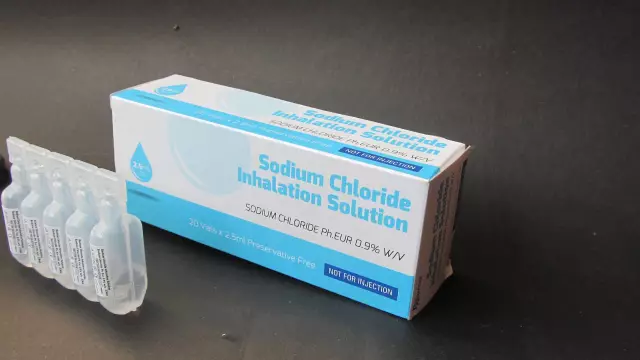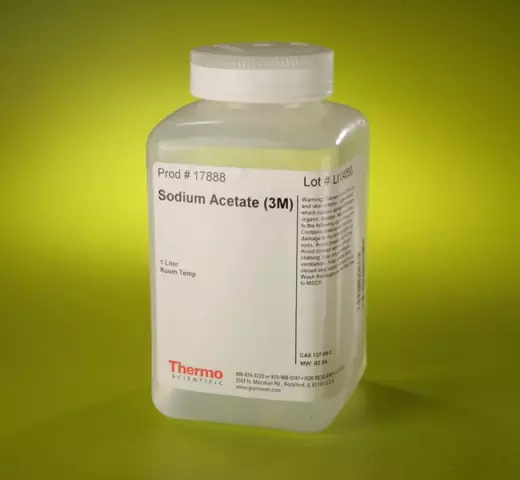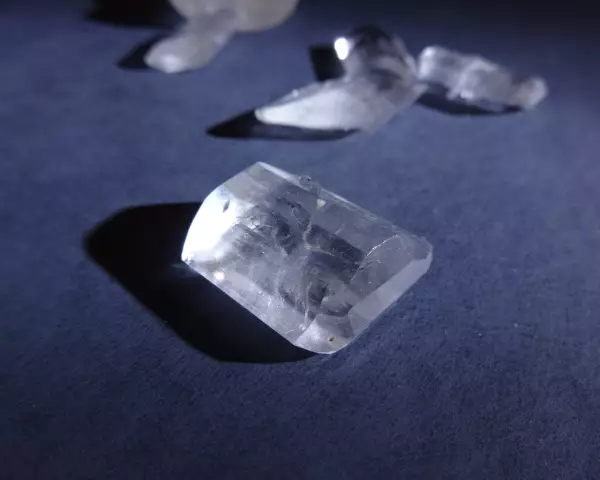- Author Rachel Wainwright wainwright@abchealthonline.com.
- Public 2023-12-15 07:39.
- Last modified 2025-11-02 20:14.
Fusidin sodium
Fusidin sodium: instructions for use and reviews
- 1. Release form and composition
- 2. Pharmacological properties
- 3. Indications for use
- 4. Contraindications
- 5. Method of application and dosage
- 6. Side effects
- 7. Overdose
- 8. Special instructions
- 9. Application during pregnancy and lactation
- 10. Use in childhood
- 11. In case of impaired renal function
- 12. Drug interactions
- 13. Analogs
- 14. Terms and conditions of storage
- 15. Terms of dispensing from pharmacies
- 16. Reviews
- 17. Price in pharmacies
Latin name: Fusidin-Sodium
ATX code: J01XC01
Active ingredient: fusidic acid
Manufacturer: JSC "BIOSINTEZ" (Russia)
Description and photo updated: 2018-23-11

Fusidin sodium is an antibacterial drug of polycyclic structure.
Release form and composition
Fusidin-sodium is produced in the form of enteric-coated tablets: round, biconvex, dark pink (20 pcs. In orange glass cans or polymer bottles, 10 pcs. In blisters; in a cardboard box 1 can / bottle or 2 cell packs).
Composition for 1 coated tablet:
- active substance: fusidin sodium salt - 125 or 250 mg;
- auxiliary components: povidone (low molecular weight medical polyvinylpyrrolidone 12 600 ± 2700), calcium stearate, milk sugar (lactose);
- enteric shell: acetylphthalylcellulose (cellacefate), titanium dioxide, polysorbate-80, liquid paraffin, azorubin dye.
Pharmacological properties
Pharmacodynamics
The active component of Fusidin sodium - fusidic acid (in the form of sodium fusidate), inhibits the ability of microbes to reproduce in the body, suppressing bacterial protein synthesis, thus providing a bacteriostatic effect. Shows high antibacterial activity against staphylococci, especially strains of Staphylococcus aureus, Staphylococcus spp. and Staphylococcus epidermidis (including methicillin-resistant ones), Clostridium spp., Neisseria gonorrhoeae, Nocardia asteroides, Neisseria meningitidis. The drug is effective against Neisseria spp., Moraxella spp., Haemophilus spp. and Corynebacterium spp., as well as Staphylococcus, which show resistance to streptomycin, penicillins, erythromycin, chloramphenicol.
The antibiotic is less active against Streptococcus spp., Including Streptococcus pneumoniae.
Shigella spp., Proteus spp., Escherichia coli, Salmonella spp., Fungi and protozoa are resistant to Fusidin sodium.
Pharmacokinetics
After oral administration, the drug is well absorbed in the gastrointestinal tract, reaching high blood concentrations.
Fusidin sodium penetrates into cartilage and connective tissues, skin and subcutaneous tissue, bones, liver, lungs, pleural exudate. As a result of long-term use, its cumulation was noted.
The substance is excreted from the body mainly together with bile, to a lesser extent excreted by the kidneys with urine.
Indications for use
According to the instructions, Fusidin sodium is recommended for the treatment of pneumonia, otitis media, septicemia, abscesses, furunculosis, phlegmon, soft tissue infection, infected wounds and burns, osteomyelitis caused by strains of gonorrhea resistant to benzylpenicillin (or in case of patient hypersensitivity to benzylpenicillin).
Contraindications
The drug is contraindicated for use in hyperprothrombinemia, in children under 3 years of age and in patients with hypersensitivity to any of its components.
For patients with chronic renal failure, Fusidin sodium is prescribed with caution.
Instructions for the use of Fusidin sodium: method and dosage
The tablets are intended for oral administration, preferably immediately after a meal.
The recommended dosage regimen depending on the age and severity of the disease:
- adult patients: daily dose - 1500 mg (divided into 3 doses of 500 mg at intervals of 8 hours); treatment of severe infections: the first 2 days in a daily dose of up to 2000-3000 mg, then the dose is reduced to the standard (1500 mg). The average duration of therapy is 1-2 weeks;
- children: the daily dose for children aged 3-4 years is 40-60 mg / kg, divided into 3 doses; the daily dose for children over 4 years of age is 20-40 mg / kg, divided into 3 doses. The average duration of therapy is 1-1.5 weeks.
Osteomyelitis treatment can last from 2-3 weeks or more.
Side effects
The use of Fusidin sodium can cause such adverse reactions as belching, abdominal pain, nausea / vomiting, diarrhea, eosinophilia and hypersensitivity reactions, manifested by redness of the oral mucosa and pharynx, pain when swallowing and skin rash.
Overdose
Data on drug overdose have not been reported.
special instructions
In the case of a severe course of the disease and, if necessary, long-term therapy, Fusidin sodium is recommended to be used in combination with semisynthetic penicillins / tetracyclines, this increases the effectiveness of treatment and prevents the emergence of resistant microorganisms.
To prevent dyspepsia caused by the local irritating effect of tablets on the gastrointestinal mucosa, and to reduce the likelihood of its development, Fusidin sodium should be taken simultaneously with liquid food.
The development of allergic phenomena requires immediate discontinuation of the drug and desensitizing therapy.
Fusidic acid is a reserve antibiotic when infected with staphylococcal strains that are resistant to penicillin and other antibacterial drugs.
Application during pregnancy and lactation
Fusidine sodium salt has the ability to displace bilirubin from the connection with blood plasma proteins, thereby increasing the risk of developing nuclear jaundice in newborns. If it is necessary to use Fusidin sodium during pregnancy, a careful assessment of the intended benefit to the mother in comparison with the potential risk to the fetus is required.
Pediatric use
In pediatric practice, the use of the drug for the treatment of children under the age of 3 is contraindicated.
With impaired renal function
Fusidin sodium is prescribed with caution in patients with chronic renal failure.
Drug interactions
The interaction of fusidic acid has not been sufficiently studied to date, the data are ambiguous. However, it has been reliably established that:
- antacids reduce drug absorption;
- cholestyramine reduces the plasma concentration of fusidine;
- rifampicin and some beta-lactam antibiotics do not change or reduce (mutually) their effectiveness against a number of strains of microorganisms while taking sodium salt with fusidine;
- glycopeptides, fluoroquinolones mutually reduce the effect;
- benzylpenicillin with fusidin sodium salt in relation to penicillinase-forming staphylococci gives a synergistic effect, and in relation to bacteria sensitive to benzylpenicillin - additive;
- macrolides show pronounced synergism with fusidine;
- tetracycline, streptomycin and chloramphenicol are predominantly additive with Fusidin sodium.
Analogs
Fusidin-sodium analogs are: Fusiderm, Fusidanat, Futsitalmik, Futsidin, etc.
Terms and conditions of storage
Store at temperatures up to 25 ° C in a dry, dark place. Keep out of the reach of children.
Shelf life is 2 years.
Terms of dispensing from pharmacies
Dispensed by prescription.
Reviews about Fusidin sodium
Since the drug does not belong to a broad-spectrum agent, its use is advisable only after a preliminary analysis of the pathogenic microflora. Therefore, negative reviews about Fusidin sodium are left mainly by people who used the antibiotic without a medical prescription. They report ineffectiveness of the drug and indigestion during treatment.
In contrast, patients who take the pill as directed by a physician indicate that the drug is helpful for diseases when broad-spectrum antibiotics are ineffective.
The price of Fusidin sodium in pharmacies
Estimated price of Fusidin-sodium, enteric-coated tablets, for 20 pcs. in the package: at a dosage of 125 mg - 290-358 rubles, at a dosage of 250 mg - 389-510 rubles.

Maria Kulkes Medical journalist About the author
Education: First Moscow State Medical University named after I. M. Sechenov, specialty "General Medicine".
Information about the drug is generalized, provided for informational purposes only and does not replace the official instructions. Self-medication is hazardous to health!






